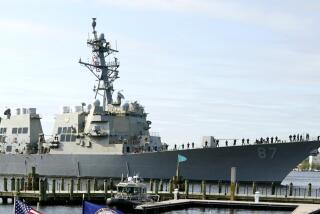Merchant Marines in Gulf Get War Hazard Pay : Shipping: Even so, there are reports that some foreign seamen are refusing to take on : assignments.
- Share via
American and British merchant marines working ships in the Persian Gulf have begun receiving hefty “imminent danger” pay, bonuses designed to encourage commercial seafarers to continue to ship military supplies into an area that has become a war zone.
The merchant marines--like commercial seafarers of other nations--work for companies that operate under contracts with military divisions of governments aligned to force Iraq out of Kuwait. American seafarers have supplied the U.S. military in the gulf since the United Nations ordered the economic blockade of Iraq on Aug. 6. However, some Japanese, German and Spanish crews have balked--refusing to sail into blockade waters.
Now that war has erupted, it appears that dramatic wage hikes are still not enough to lure some worried British sailors into the war zone.
“There’s a high level of concern,” says Andrew Linington, spokesman for the National Union of Marine, Aviation & Shipping Transport Officers (NUMAST), which represents British merchant navy officers. “We’ve been here before, if you like.”
During the Iran-Iraq conflict, which saw merchant vessels specifically targeted, more than 300 merchant seamen were killed and more than 500 merchant ships were attacked, the union official said.
There are no reports of Americans resisting such duty, according to the Washington-based Seafarers International Union of North America, which represents most U.S. commercial sailors aiding the war effort.
“They don’t need much encouragement because they have a sense of duty,” said a spokeswoman for the union.
Still, the U.S. government--prodded by companies with military contracts and by seafarer unions--last month began providing “imminent danger” pay to sailors carrying out missions for the U.S. Maritime Administration. The Maritime Administration agreed to provide seafarers an additional $130 per month. The average non-officer on a merchant marine vessel--excluding overtime and weekends--earns about $1,500 per month.
About 2,300 American seafarers on 70 ships are carrying out missions for companies under contracts with the Maritime Administration. The ships--owned by the federal government but maintained and operated by private firms--deliver ammunition and other cargo used by the military.
The British seafarers unions--NUMAST and the National Union of Rail, Maritime & Transport Workers (RMT), which represents crew members--negotiated a contract with Britain’s shipowners last week that gives the sailors 100% pay hikes while sailing through certain areas in the gulf region.
Although pay scales vary widely for merchant seamen, the average wage for those working on British ships is roughly $500 weekly for crew members and $750 for officers.
Nonetheless, a significant number of seamen are exercising their right not to work on gulf-bound ships, says Linington, who figures that they represent “a minority so far, but a noticeable one.”
With most trips into the gulf lasting about one week, “there’s no fortunes to be made,” says the union official. “Even 200% is not a great deal of reward for the kinds of risks they’re taking out there.”
More to Read
Sign up for Essential California
The most important California stories and recommendations in your inbox every morning.
You may occasionally receive promotional content from the Los Angeles Times.













